The Blog
Love and courage: the true story of life in Kyiv
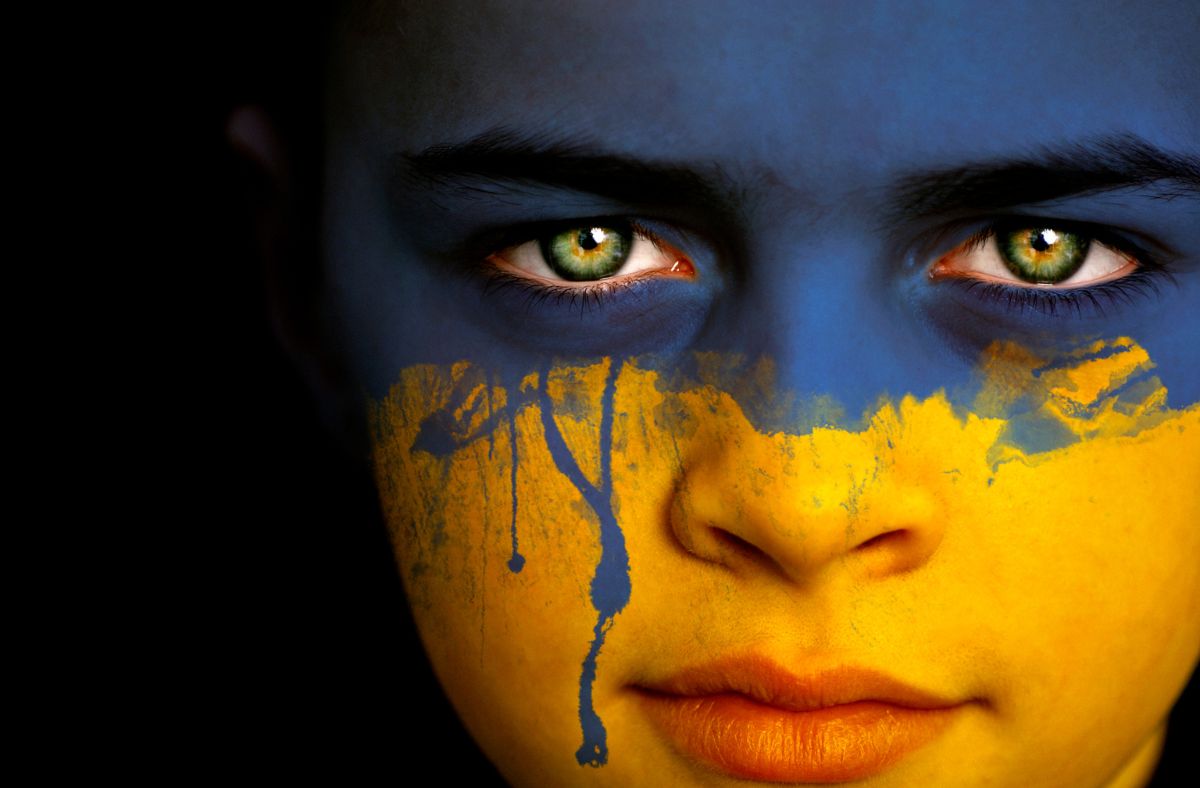
As I write this on Christmas Day, I can’t help but think of everybody living in conflict around the world. The media tells us that Christmas is a time of joy, of celebration. It’s a time to spend with our family and loved ones, yet I often find it one of the loneliest. So it is while I ponder these thoughts that I think of my friend Anna in Kyiv. What will Christmas be like for her today?
On February 24th, 2022, Russia launched a full-scale invasion of Ukraine. There have been many wars during my 36 years of life, but never has one felt so close to us, in a country that I have visited, and in a place that friends call home. Streets that I had only walked down a few years before were now appearing on the news channel.
Over the last few years, I have become somewhat fascinated by everyday life in countries at war. Of course, the news always focuses on the front line, so we conjure images of trenches, empty streets, and bombed-out buildings. I imagine scenes from movies like Black Hawk Down and Hurt Locker. But the more I speak to people living in conflict zones, the more I realise that there is a degree of normalcy to life away from the front line. People still go to work, cook dinner, walk the dog, go on dates, bake cakes and get drunk. But even as I write those words, I know there is one significant thing missing: the emotions that accompany every single one of those actions.
But how can I write about those feelings if I am not there? I can’t. Not only would I not be able to ever do it justice, but I would likely get it wrong too. For this reason, I decided to reach out to my friend Anna. So this is Anna’s story!
Anna, thank you so much for agreeing to be interviewed. Please start by telling us a little bit about yourself.
Sure. I have lived in Kyiv my entire life. It is where I graduated from school and high school, it is where I met my husband, and it is where I got married. Kyiv has always been my home. Being in Kyiv is as natural as breathing air or drinking water. My entire life has been built in this city.
I am a travel photographer and photo editor, so I have been lucky enough to travel worldwide. I’ve always loved to travel, and I love exploring new countries. I would spend extended periods away from Kyiv until my calling to come home was too strong, and then I’d return to where I have always felt most comfortable: Kyiv. As they say, home is not a place. It is a feeling! That is what Kyiv is for me. It is where I have built my life and where all of my loved ones are.
Where were you on February 24th, 2022, when russia launched a full-scale invasion of Ukraine?
Please note that at Anna’s request, I am not printing russia with a capital R, as good grammar would dictate. This is because Ukrainians have put in place grammatical sanctions which mean neither russia nor the names of russian politicians deserve the use of capital letters.
February 2022 was a special time for us. We were on our first trip abroad since COVID. We hadn’t been abroad since March 2020, so we wanted this first trip to be extra special. My husband and I chose to go to Budapest as it was the first place we ever visited together, back in 2009. We planned our “great return” with great care to make it extra special. We booked a boat hotel on the Danube River and enjoyed the views of the city centre. As we floated past the Gothic Parliament and underneath the Margaret Bridge I couldn’t help but think it was magical. Our phones were switched off so that we could truly enjoy our much-awaited romantic break. We were completely oblivious to what was going on back home.
At what point did you realise what was going on?
It wasn’t until 7 pm, just after we had finished enjoying a perfect Hungarian dinner. I switched on my phone to post photos of our trip on Instagram, and that is when I saw the messages from our parents. The texts read something like this:
“We’ve been attacked! They crawl like cockroaches from all directions, even from the Belarus border. They have occupied Chornobyl Nuclear Power Plant and are trying to land at Hostomel Airport. Ukraine is on fire. May we take your car to leave Kyiv?”
How did you feel when you saw those messages?
To begin with, I couldn’t even understand what they meant. I was in shock. Actually, shock doesn’t even cover it. I couldn’t believe it. I replied, “What do you mean we’ve been attacked”. My mother answered, “We have been under shelling since 4 am. We have sirens, missiles, fighter aircraft, and sabotage and reconnaissance groups in the cities.”
All I wanted to do once I heard what was going on was return home. I wanted to help. We told our parents, “We are packing our bags and coming home”. They were having none of it. “Stay where you are! It’s dangerous, stupid, and wrong! It’s impossible. There is fighting on the streets in many regions. Transport isn’t operating normally, and everyone is trying to leave, not come back! Unless you have military skills, you are not needed here!”
They spoke, but we didn’t listen. We wanted to get home. We didn’t want to be in far away land watching it unfold. We wanted to be there with our loved ones. Flights were out of the question. The airspace had been closed. We tried to book bus and train tickets, but even when companies let us, these were cancelled shortly after. We slowly started to understand there was no way back.
I can genuinely say that it was the worst moment of my life. You can prepare for many eventualities, but you can’t prepare for this. I felt so hopeless, so far away from home and unable to help. Although I knew my city was at war, I needed to get back. My cat, Gaga, was there, alone and no doubt scared. I was fearful for him.
Gosh, I didn’t realise you had a cat. How did you get Gaga to safety?
Gaga stays at home when we travel, and my father visits daily to feed and pet him and spend time with him. He only works 10 minutes away, so it is convenient. Also, we don’t have cat sitters in Kyiv, so this is the only option.
After the war broke out in Kyiv, the public transportation system stopped working, so my dad had to walk 15 km to our apartment to take care of Gaga. We were hoping that public transport might start back up again, but when it didn’t, we had to devise an alternative plan, as it was too much to ask my dad to walk to see Gaga every day. We were also worried for Gaga all alone with the loud blasts and the sound of the fighter aircraft. On the one hand, we were reluctant to change his location. But on the other hand, it was our only option.
I can only imagine how terrifying it must have been for all the animals who wouldn’t have understood what was happening. Where did you take Gaga? Was it easy to move him?
It was tough, as there was no public transport, and because my in-laws live on the opposite side of the Dnieper River, it was hard to find anyone willing to cross the bridge, as shelling could easily prevent the return back across. Finally, after a lot of searching, we found a taxi driver on the internet that was willing to help.
My mother-in-law is a real hero. Despite the dangers of the journey, she insisted that she save Gaga. She said he is her only grandson and therefore had to save him. They made it to our apartment OK, but once there, the shelling started. They drove as fast as possible back across the bridge. She said she has never been on such a scary car ride. On the way home, they passed a car that had been shot. A pet carrier was lying in the middle of the road, surrounded by a puddle of blood.
I am so grateful to my mother-in-law and the taxi driver to have risked their lives to save Gaga. I can’t even bear to think about him alone, without food or water. The day after he was rescued the bridges were all closed, and a two-day curfew was imposed, so we were so relieved that he was safe.
WOW! What a brave woman your mother-in-law is. I understand how strong the love for a pet is, but to go out on such a mission takes some serious courage! This isn’t the first amazing story you have told me about your mother-in-law though. Can you share what she does for the soldiers?
Yes, she makes apple jams for the soldiers. The other day we called her to see how she was doing, and she complained that the stores were closed because of the shelling, and she had run out of sugar, so she couldn’t make any. She was cursing the russians as she now had to wait for the raid alerts to be over before she could go and buy some more. She is an amazing woman!
So while all this is going on, where are you? Still trying to return home?
We never stopped trying to return home. The problem is that it wasn’t possible. But because we wanted to return home, we couldn’t settle either, as we were hoping it would just be a few more days before it would be possible. So we would book a hotel for a week, monitor the situation, and when we realised it wouldn’t be possible, we would re-book the hotel for another week.
Because we had left Ukraine before the invasion, we couldn’t qualify for refugee status, which meant we couldn’t access cheap accommodation. We spent two weeks in Budapest, but this was one of the main areas refugees were flocking to, and we soon could not afford any of the hotels, so we moved on to Prague. But again, after a week, we once again could not find a hotel for a regular price.
We were still desperate to return home, but our parents would repeat the same message every day. “Don’t come back. It is still dangerous. Parts of the Kyiv region remain occupied. There are daily shellings, and it is hard to live here. The stores are closed, and there is not much food. Please, listen to the Mayor. He is telling people not to return yet”.
We found ourselves unable to afford hotels, unable to get refugee status, and unable to return home. It was at this point that an Instagram friend invited us to stay with them. They had invited us before, but we didn’t want to burden anybody. But three weeks in, we now understood that we wouldn’t be able to return home soon, so we accepted their generosity and stayed at their home in Switzerland.
How long were you with them?
We stayed with them for three weeks before moving on to Italy for a week, from where we took a flight to Poland and eventually a train back to Kyiv.
You are somewhere safe, and Gaga is now safe too. So why did you want to return to Ukraine, knowing how dangerous it was?
As I tell you this story it sounds like I was on some great European adventure. Yes, we did see beautiful landscapes and tried to distract ourselves by exploring medieval towns. But when your country is at war, it is impossible to enjoy these experiences. Although our bodies were in these beautiful places, our minds were in Ukraine. War is not only something around you. It isn’t only the blasts and weapons. War is inside you too, like a flame burning inside your chest, filling you with fury and hate, fear and sorrow. A burning that causes pain instead of providing warmth. It is with you everywhere you go; on the street and in the park. It follows you into museums, churches, and cafes. And it won’t even leave you at night.
That is the best way I can describe our desire to return home; so that our body and mind could be together again.
How was the trip home?
The trip home was eventful and stressful, but not more than we had expected. We knew it would be hard. Our flight from Italy to Poland was delayed by 2 hours, so we thought we might miss our train from Przemysl to Kyiv. Thank God the train was also delayed, so we made it!
It was an evening train that should have seen us arriving in Kyiv in the morning. However, there was a danger of bombing, so we moved very slowly. We would stop randomly in the middle of nowhere for 1-2 hours at a time until it was safe to proceed again. We would then speed along before coming to an abrupt halt once again. It was scary and nerve-wracking. We were one of the few people on the train. Most got out in Lviv (West Ukraine), leaving only 4 or 5 of us for the remainder of the journey.
What were your first impressions as you reached Kyiv?
Once morning came, and it was light outside, I started looking out the window. All the station and road names had been blacked out to make it impossible to know where we were. This had been done to confuse the russians, who had no GPS and were relying on old Soviet paper maps.
The other things I noticed were the long zig-zag-shaped trenches that crossed fields and the many checkpoints on the roads guarded by armed territorial defence members. There were also many anti-tank barricades set up along the way. It was a completely different country from the one we had left!
It was the same when we arrived in Kyiv. Our city had been transformed with trenches and barricades made with bags of sand. There were many checkpoints everywhere. Only part of the public transport was in service, and many shops were still closed. But at least the Kyiv region was no longer occupied. The Ukrainian army had retaken charge, and there was hope in the air.
Your mum was very against you returning. How did she take the news of you coming back?
We returned on April 14th, which happened to be my mother’s birthday. I can’t say we planned it that way, and it certainly wasn’t a birthday gift since she didn’t want me to return since she felt it wasn’t safe. But she was of course also delighted to see us. However, the best gift in her mind was the sinking of the moskva warship, which also happened on the 14th of April. She took that as a gift to her from our military forces.
By the way, I don’t know if you know this, but the moskva warship has become very popular in Ukraine since the first day of the invasion. The ship had attacked Zmiyinyi Island and reached out to the island’s garrison over the radio, demanding its surrender. The message it got back was, “russian warship, go f#€k yourself!”. This became a very popular story in Ukraine.
So the region of Kyiv is no longer occupied, but Ukraine is still very much at war. What is it like living in Kyiv?
Kyiv is no longer a frontline city. The battle is now a long way away, so we don’t have problems with food or store openings. In fact, in one way, it is life as usual. Restaurants, bars, and theatres are open. You can go to the hairdresser or get your nails done. The bank is also open, and the post is operating normally again. But, of course, it wasn’t like that straight away. It has taken time to return to this new level of normalcy, but even in April, restaurants were open. In fact, we celebrated my mother’s birthday at a restaurant.
Life on the frontline is entirely different though.
So is it really life as normal?
Yes and no. We have sirens, although less often than we did in the summer. But they still go off. And after the sirens come the russian missiles and drones. For example, on December 14th, the russians launched 13 Iranian Shahid drones on Kyiv. Our army managed to shoot them all down, but the air alert went on from 6 am to 10 am. During the air raid, transport doesn’t operate, and all stores, banks, and other businesses must close.
Once I had to visit the dentist on the other bank of the Dnieper River. I had to wait in the metro for over an hour because it couldn’t cross the bridge during the alert. Luckily the dentist waited for me, and I could still have my appointment.
Other times I may have gone shopping or to the post office. We will wait in the queue for ages only for the sirens to go off, only to have to give up and return later. It feels like wasted time, although it is for our safety. When the sirens go off, you are meant to either go to a shelter or make sure you are behind at least two walls and away from any windows. But the truth is, we don’t do it anymore. We know it’s dangerous, but the sirens have become a part of life.
Sometimes the alerts happen at night, and we don’t even hear them. For example, one night, we were woken up by blasts in our neighbourhood. My husband woke up and said, “F#€k!ng Orcs”, rolled over, and went straight back to sleep. It seems terrible to say, but it has just become normal.
We hear a lot on the news that Ukraine has no electricity. What is that all about?
It started in autumn when the russians decided to destroy our power system. They thought that by doing that, we would surrender and negotiate with them. Maybe even hand over our territory and agree to their terms! I don’t understand their logic, as our army doesn’t need electricity to fight. But anyway, they have been bombing our power stations which means we have regular blackouts. The longest a blackout has lasted is 2 ½ days. We were also without water for one day.
There is an old Orthodox tradition where you light a candle in memory of the deceased. So during the blackouts, when all the apartments in Kyiv come alight with candles, we say that the candles are burning for russian death.
Our power stations are now under repair, but the russians won’t give up, so it is taking a lot of time to complete the repair work, which means we have small daily blackouts lasting 3 to 6 hours at a time. These often happen multiple times a day. It is a pain for all of us who work from a laptop, but there are now free co-working spaces running off generators that offer non-stop electricity and Starlink internet. In addition, many stores and businesses are now also using generators which means that when you walk down the street you will hear the constant humming of engines.
One of the things that always strikes me when we talk is your positivity. Your tone is always lighthearted, which we also see in the media when other Ukrainians are interviewed. How do you manage to stay so positive?
It’s pretty simple. As a nation, we have decided that we will donate funds to the army every time we feel sad. They are the only ones who can solve our issues, so the more we can help them, the faster the conflict will be resolved. So when the electricity goes off, we donate. When we hear the sirens, we donate. When missiles fly overhead, we donate. In fact, it has become like a lottery here. In August, we managed to raise over $16 million! They used this money to purchase access to satellite images. So as a nation, it is us who bought a satellite for our army. It brings us together.
You can choose how your funds are spent depending on what fundraiser you donate to. It could be medicine, uniform, body armour, helmets, thermal imagers, anti-drone guns, drones, armoured vehicles, or self-propelled artillery. You name it; there will be a fundraiser for it. What’s more, the army will let us know how they have spent the funds. There are many clips on YouTube, TikTok, and other channels where our military shows us how they have spent the money and even how to use the weapons they have bought!
When you see the fantastic work our army is doing, it is impossible not to be positive. After they liberate a village they share videos. We see the happy villagers bringing them flowers and food. We are a nation united by the same goal.
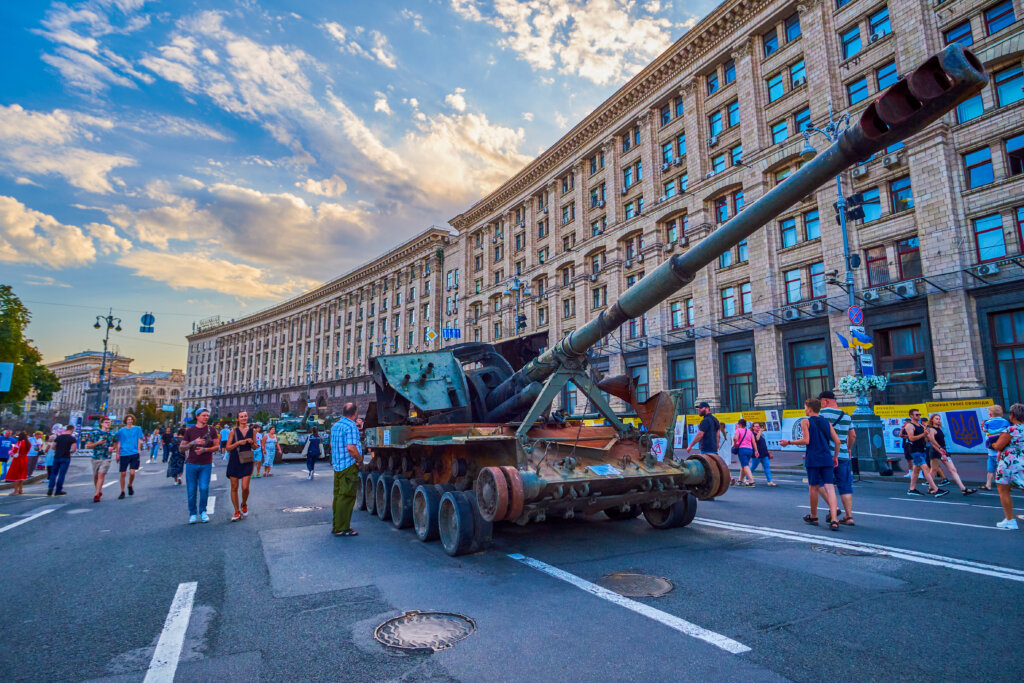
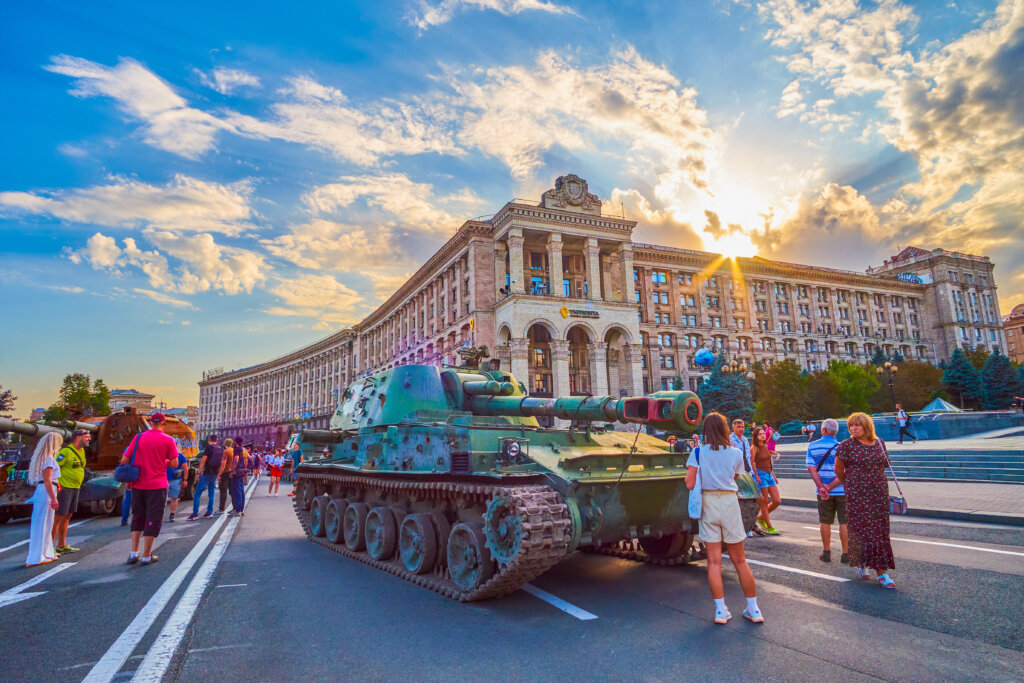
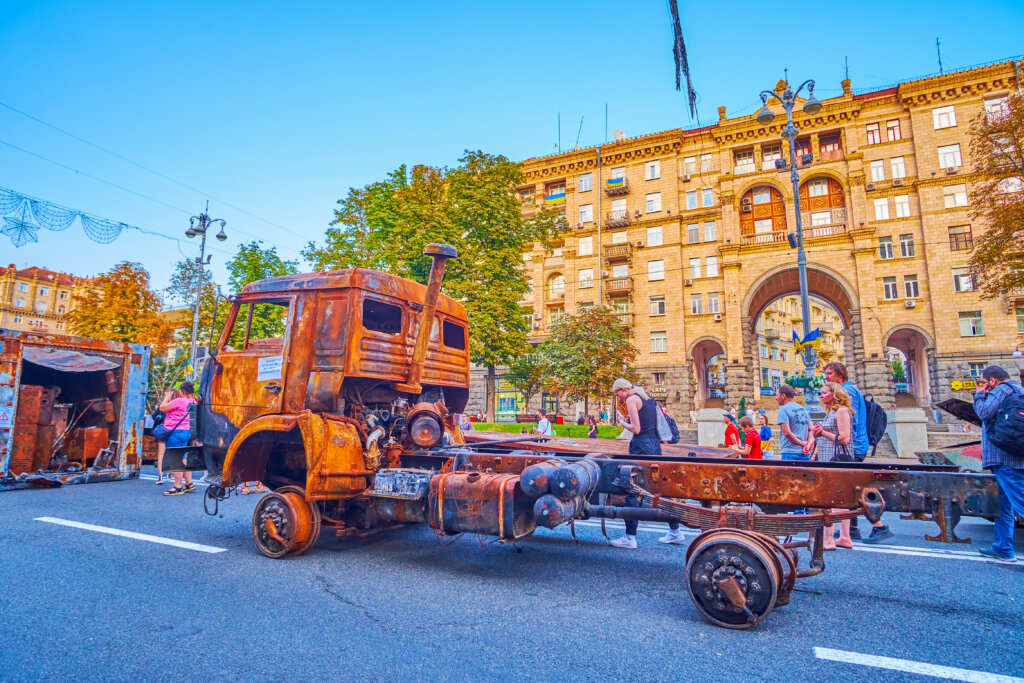
I love that fundraising has become a national hobby. The strength and resilience of the Ukrainian people have definitely inspired me, and I love that you find positivity by taking action in any way you can. Talking of positivity, it is Christmas time right now. A time for kindness and love and being merry. Is Christmas something you usually celebrate?
I have always loved Christmas. Christmas has become a very special time in Ukraine, especially because it was forbidden for so many years under the Soviet regime. In fact, all religion was banned. My grandparents didn’t enjoy the cultural and religious freedom we have nowadays.
We are still trying to rediscover what Christmas actually means. Some fully embrace the modern meaning of Christmas, while others feel it is a ridiculous materialistic holiday. However, most have their family traditions to celebrate the holiday.
The thing is, we are still trying to rediscover our pre-USSR identity so that we can share it with future generations. For me, Christmas has always been an interesting, somewhat unusual, yet magical time. As a child, I loved Christmas for the decorations, the tree, the snowy weather, and of course, the gifts! This was different from the type of Christmas my grandparents enjoyed though.
They had to celebrate all their religious holidays in secret (like Easter and Christmas), as these were outlawed. The regime banned time off over Christmas to make it impossible for people to celebrate. They didn’t even have a church in their village, as it had been destroyed. But even though celebrating Christmas during the Stalinist repressions was life-threatening, they did it anyway. But Christmas wasn’t about the excessive food and materialistic gifts. It was about spending quality time with family and thanking God for taking care of the ones you love.
I didn’t understand what my grandmother meant before. But now I do.
How was Christmas this year?
We, of course, celebrated Christmas this year. We did it despite the enemy. And we did because we wanted to show them that they can’t break us and that we believe in Ukraine. In fact, Ukrainians were more determined to celebrate than ever. We had a giant Christmas tree in Kyiv. It may not have been as rich and bright as in previous years, but it stood proud and defiant.
We also had a Christmas Tree at the main railway station. Because we can’t waste electricity due to the shortages, this one is powered by a pedal bike.
I can only imagine how long the queue of volunteers must have been!
Yes! But it isn’t only in Kyiv. As far as I know, similar public festivities are happening across Ukraine. For example, in Kharkiv, the main Christmas tree stands in the underground station as the city is often under fire.
It wasn’t a lavish Christmas this year, but we celebrated in defiance. We thanked God that we were all OK and donated to the army. We thought the russians might attack us. There were a couple of alerts, but we were able to continue with our festivities more or less as normal in Kyiv. Unfortunately, the attack on Kherson was bad. They bombed places specifically targeting civilians. There were many victims. They destroyed the central market, stores, and residential houses.
What did we do? We donated to the army. And then we donated some more. Because no matter what the Russians do, they will not extinguish the light in our hearts.
Thank you so much Anna. I can’t think of a better way to finish this interview. Thank you for talking to me and providing us with insight into what life is like in Ukraine. Please stay safe, and never lose hope. Your resilience inspires me every single day.
How can you help?
The more I speak to Anna, the more in awe I am. The resilience of the general Ukrainian population is inspiring. I am not sure I would have the bravery to face adversity the way they have. If you have been inspired after reading this interview, please consider donating to one of the many charities supporting the efforts in Ukraine.
I am supporting Street Child, whose focus is ensuring the safety of children, the most vulnerable victims in this war. You can read about the work they are doing here. So please, if you enjoyed a safe, warm, and indulgent Christmas, consider helping someone who didn’t, whether that be through Street Child or another organisation supporting the people of Ukraine.
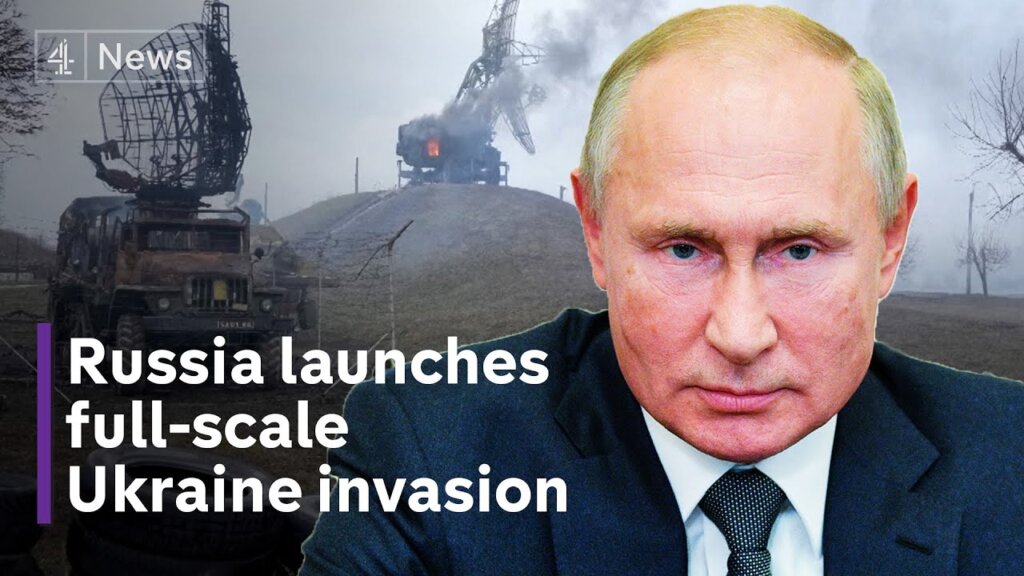
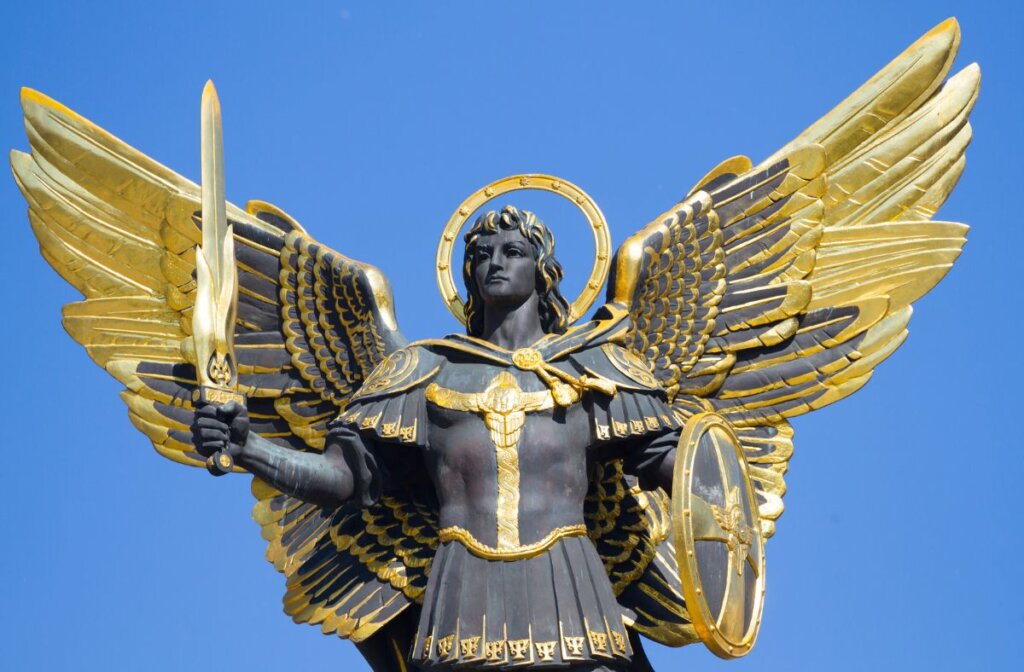
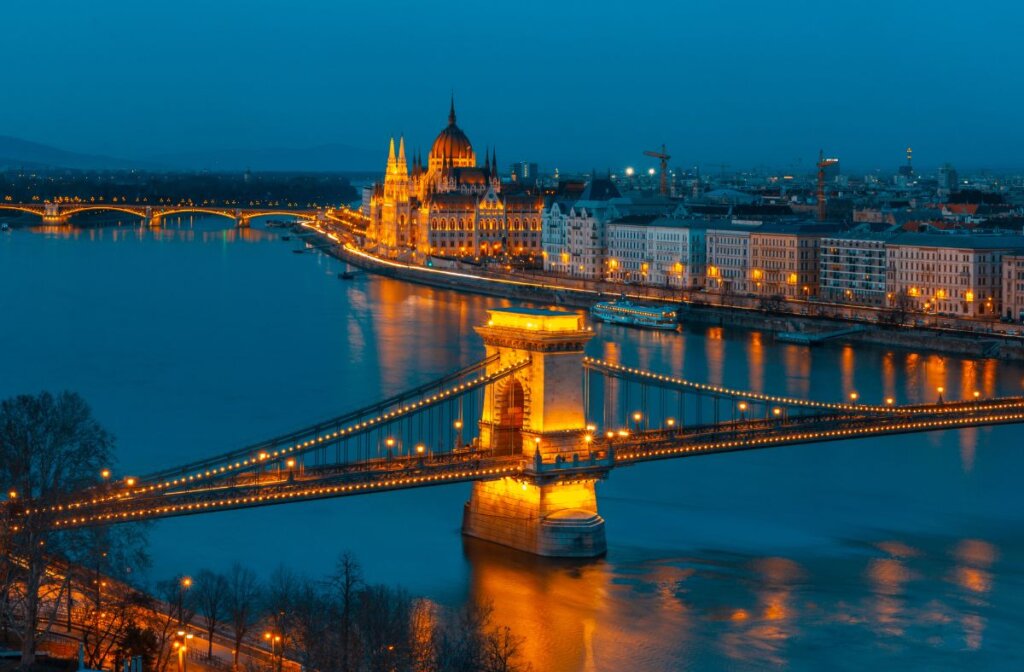
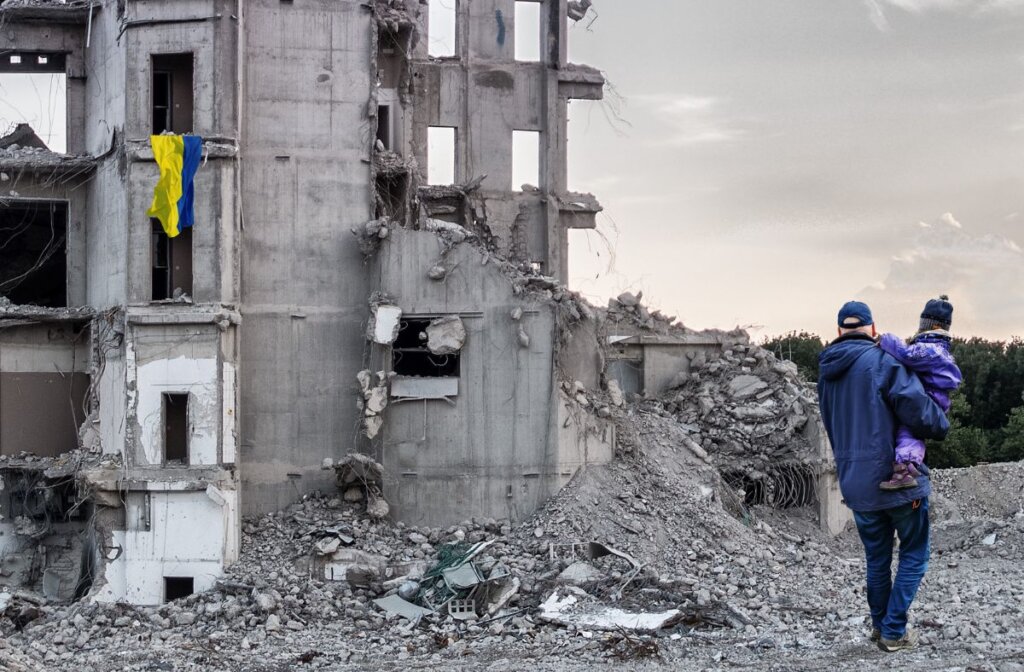
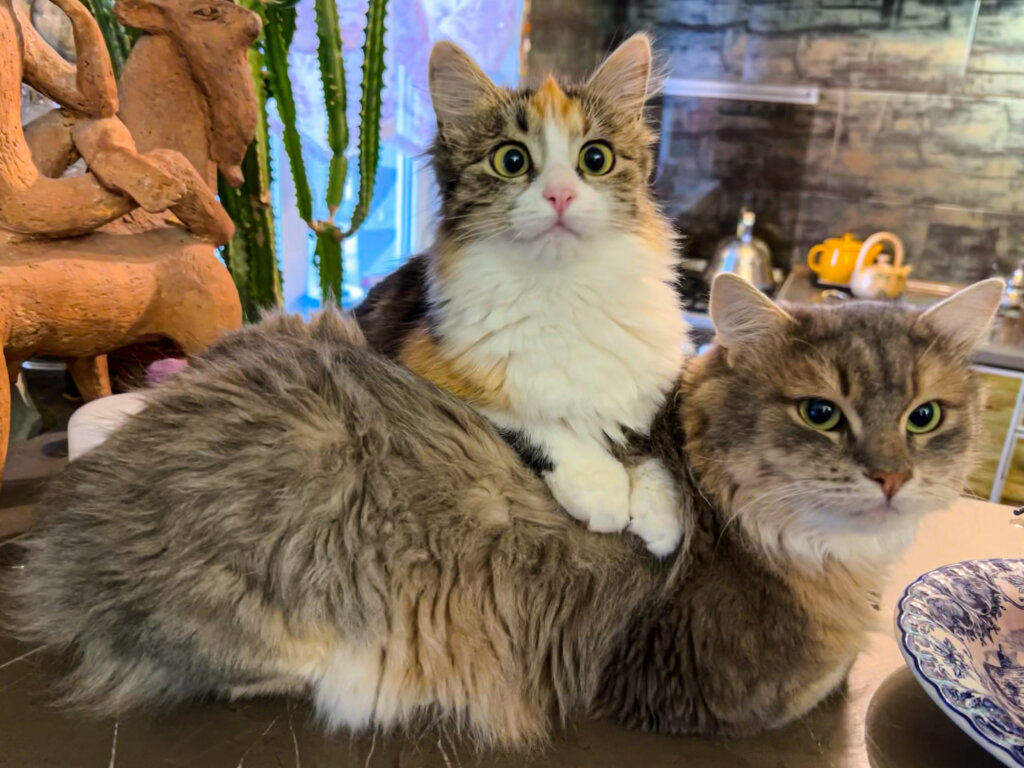
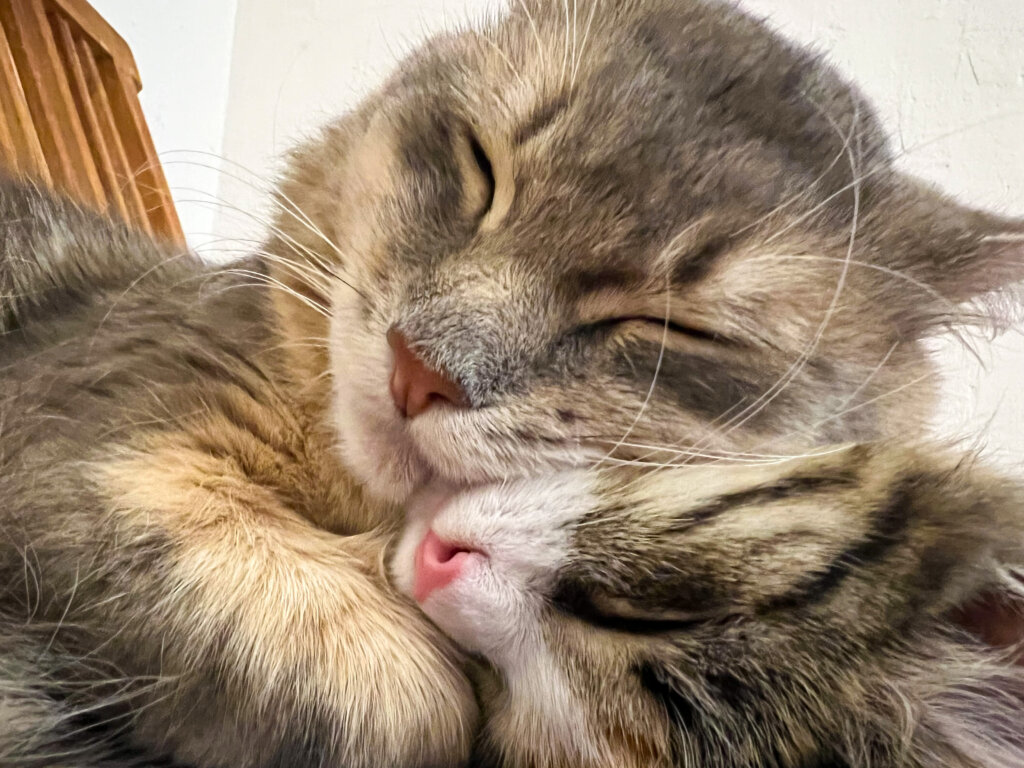
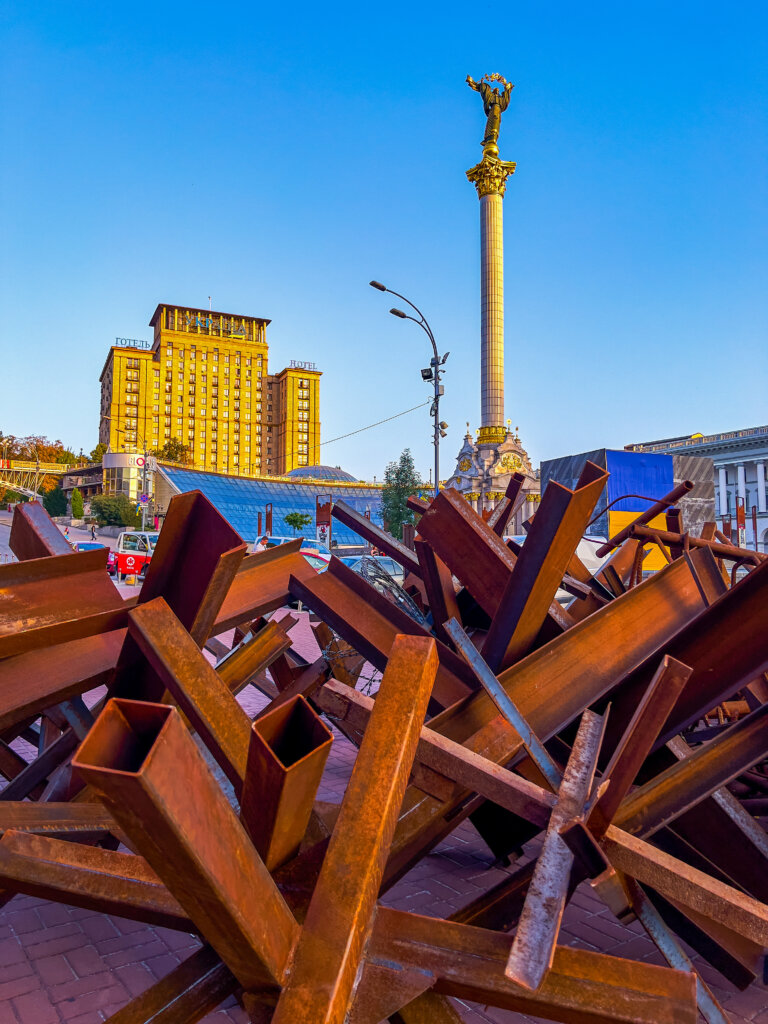
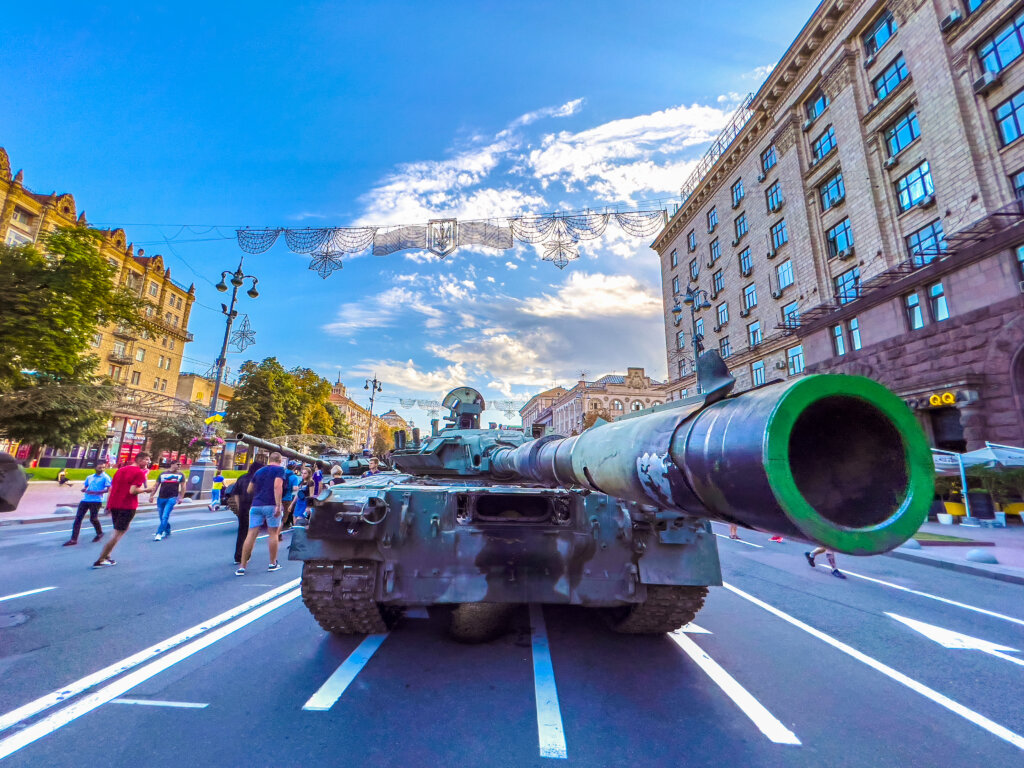
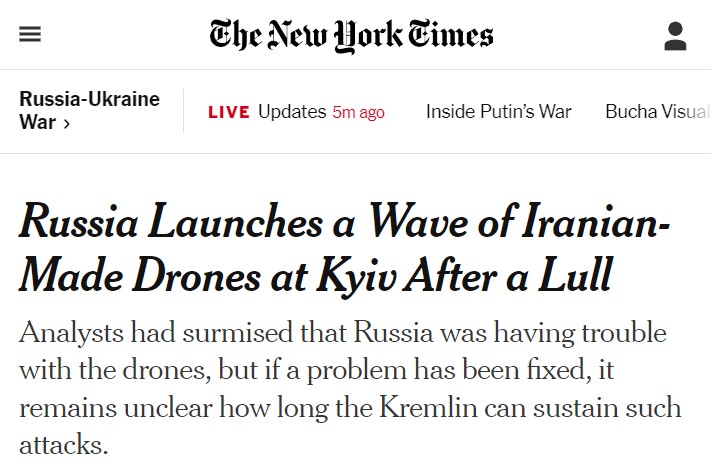
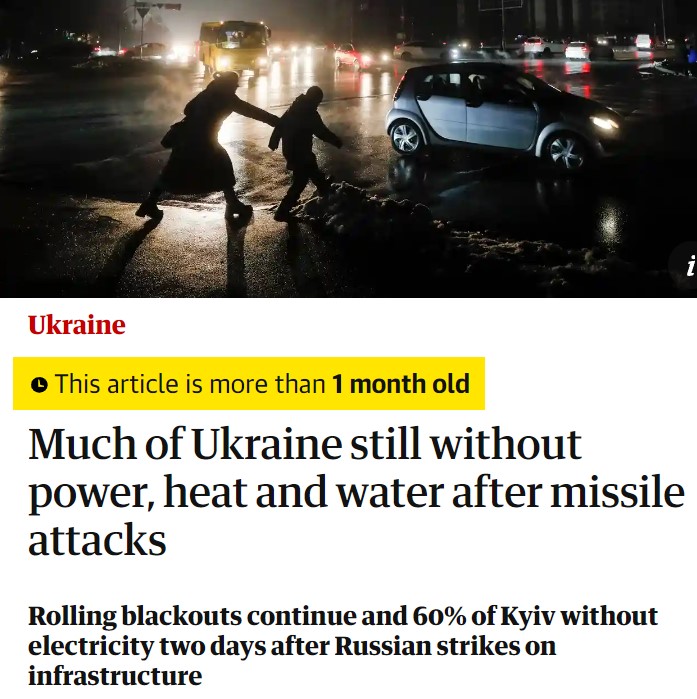
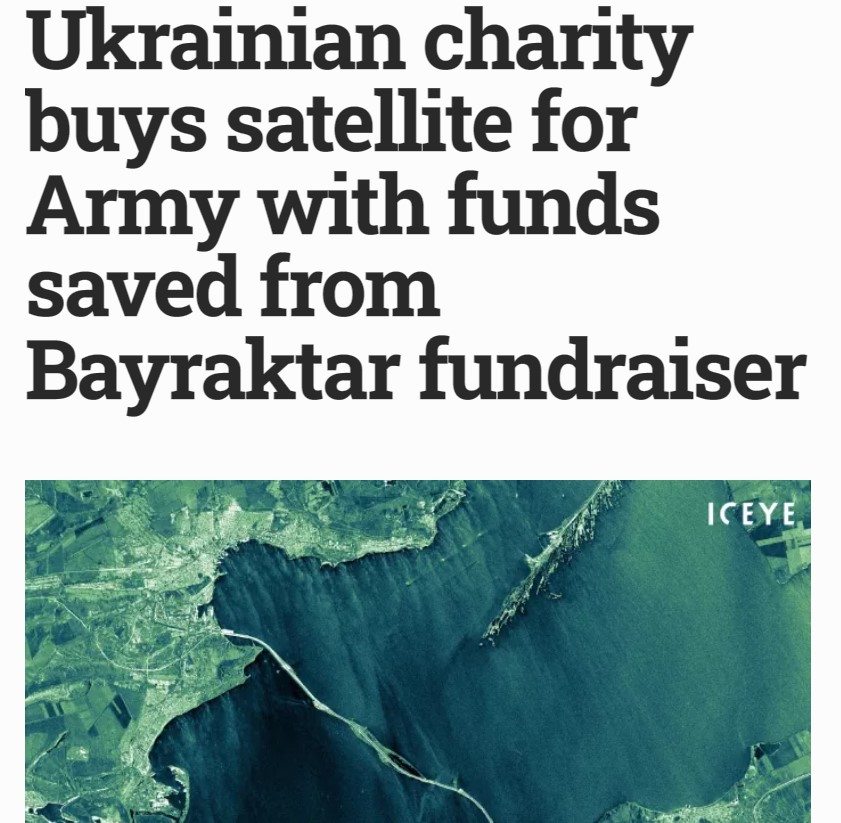
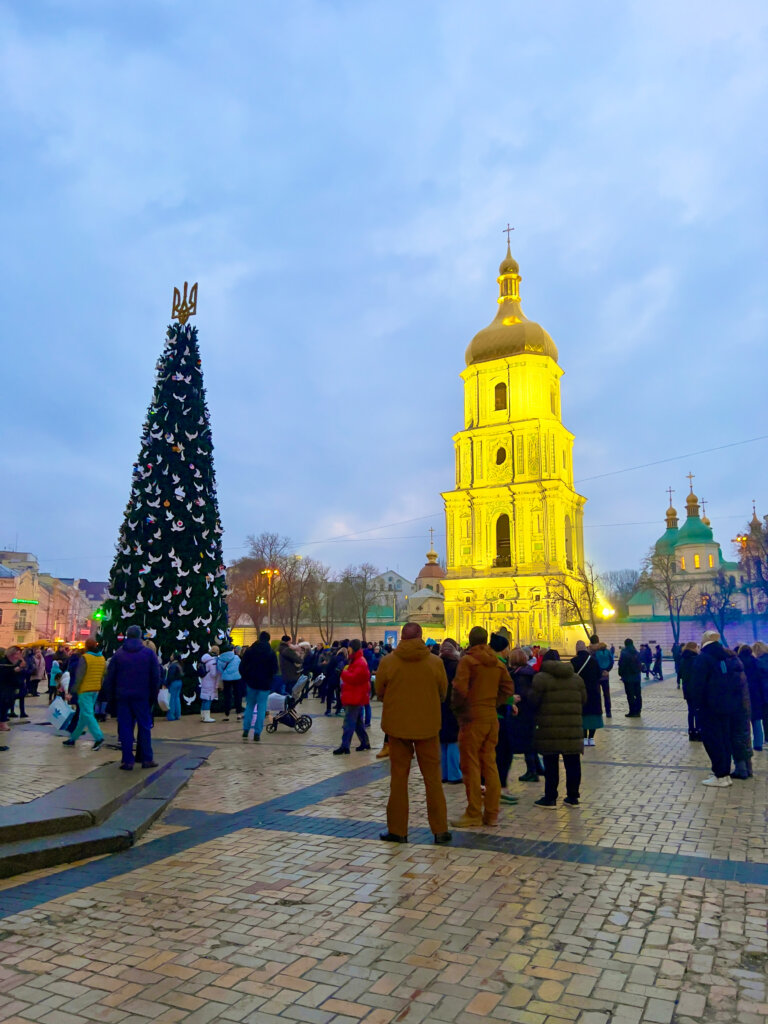
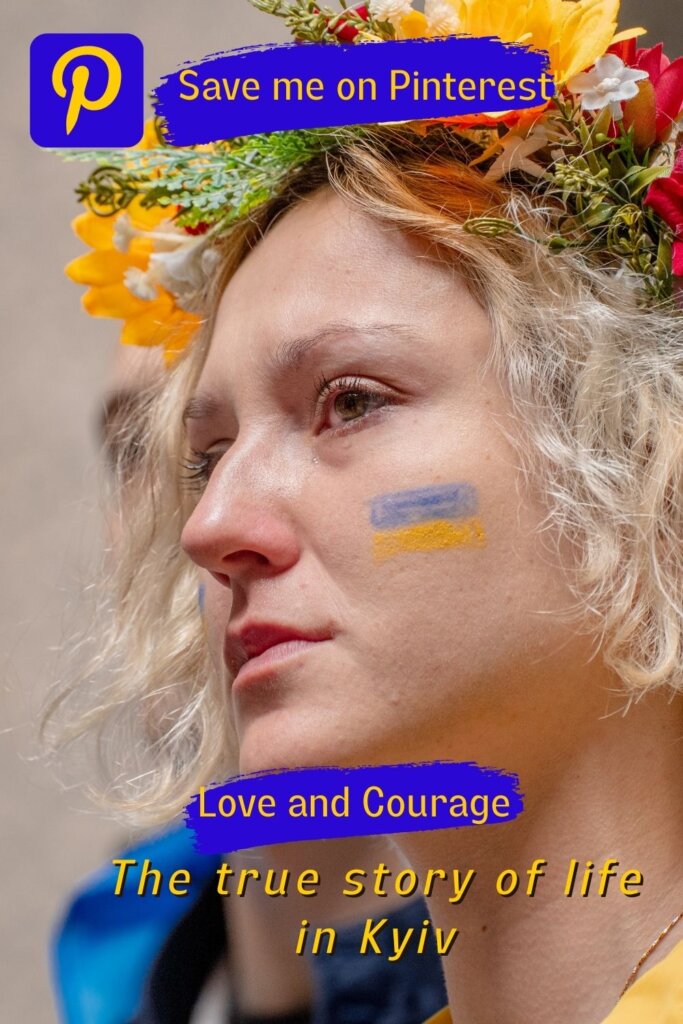
Comments will load here
Be the first to comment